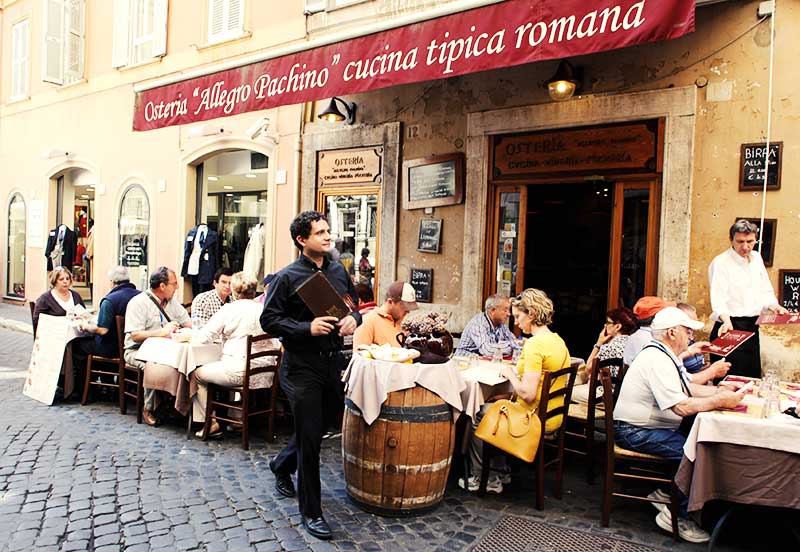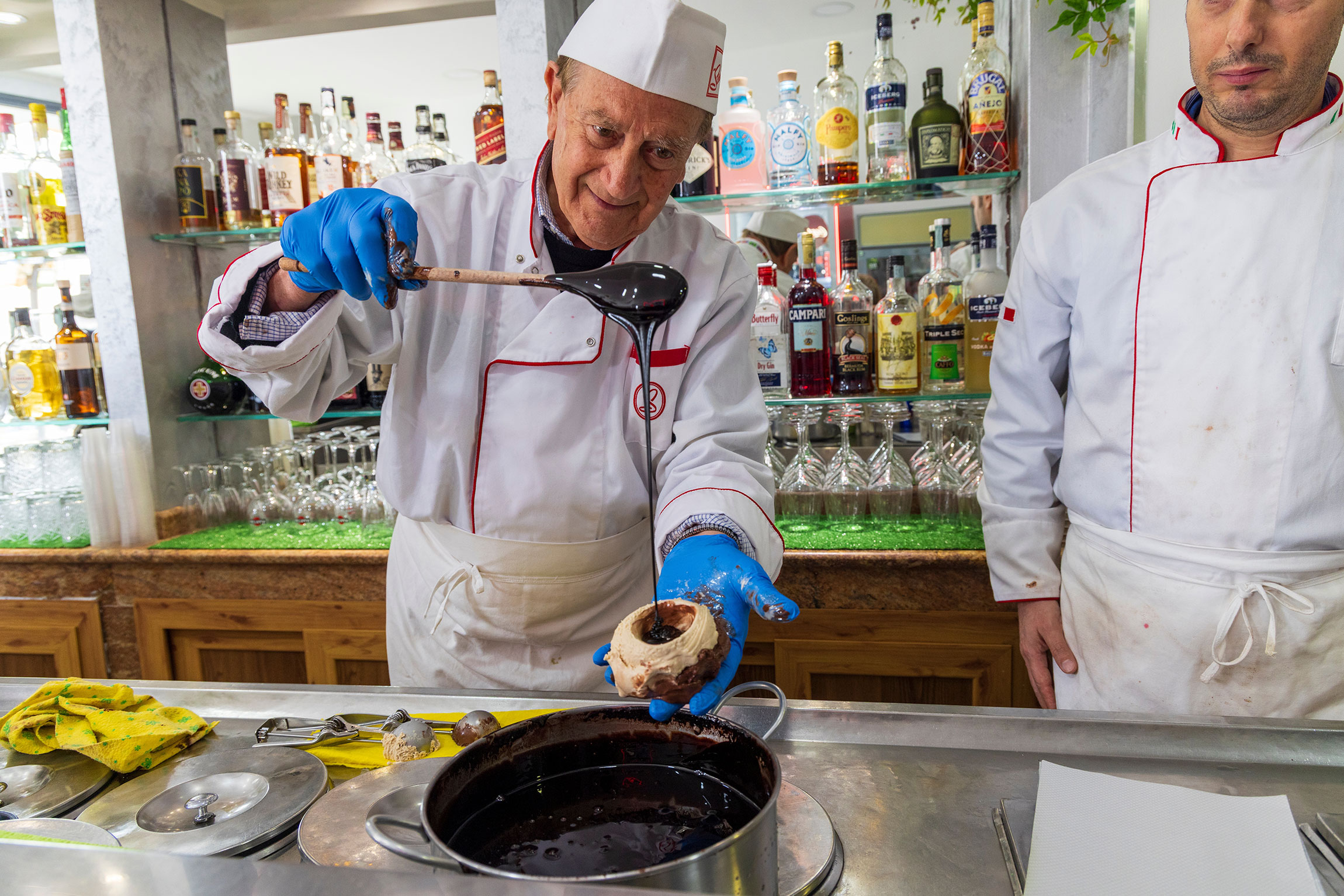There is a bit of Giovanni della Casa in every Italian, you know. What do you mean, who’s he? Della Casa, that dude who wrote the Galateo, in 1558. Not because we’re more courteous and well educated than others, but rather, because we do live by a series of rules most non-Italians ignore and that you’re not likely to be taught in any language or culture class.
You know, the type of thing most non-Italians would consider silly or irrelevant, but that we see as a sign of national bon-ton. To be honest with you, there are quite a few of this unspoken rules around the country, with some of them being more common in some areas than others, but these five are probably the most typical: let’s see if you know any of them!
1. If you ask someone for coffee, you buy!
We are not talking about a planned out coffee date with your friends here, but rather about those impromptu trips to the “bar per un caffè” that often follow a fortuitous meeting with a friend in the street. On any given day, we have at least one or two of these, depending on how much time we spend around town in our lunch breaks or doing shopping. One thing every Italian know — even if no one really tells you about it — is that, in these occasions, the one inviting always pays. There is no point fighting at the till holding your fiver under the barista’s nose: if you didn’t come up with the idea of getting that coffee, you’re not allowed to pay for it. As simple as that.

In Italy aperitivo is pretty common before lunch as well
2. Aperitivo is ok also before lunch
In the US, and in much of the rest of the world, aperitivo, that amazing Italian habit bringing together the best points of going for drinks and eating good food, is considered a synonym of Happy Hour. Something you do after work with your mates, before going home. But truth is that in Italy aperitivo is pretty common before lunch, too. Ok, lunchtime aperitivo is usually a thing for the weekend, when you can have a Spritz without having to worry about how that’ll affect your afternoon meeting with the boss, but many people do enjoy it during the week, too. If you pick the right place, you can have a nice lunch aperitivo instead of a regular meal: pizzas, focaccias, sandwiches, olives, frittate and a nice drink. What a fancy way to spend your lunch break, eh?
3. If you are fifteen minutes late, it’s ok. Anything later and you should be ashamed of yourself
We call it quarto d’ora accademico and it comes from the old fashioned habit some lecturers have to wait fifteen minutes before starting a class, so that all students arrive. Or, as it would happen more often when I was in college in Italy, so that lecturers could get that essential coffee between classes without being accused of being late. Indeed, the habit is so appreciated in Italy we extended it to all situations. In fairness, it’s not always true that Italians are perennially late, some of us are pretty precise, when it comes to it. We know how to be flexible, as we are aware there may be a bus running late, or keys that didn’t want to be found. And that’s when the quarto d’ora accademico enters the game, because we accept delays but not longer than 15 minutes. Let us wait for any more than that and you’ll be called a cafone in the best case scenario, or won’t find us at all in the worst.
4. We eat our food separate
I admit this is a rule I no longer follow, after having lived 15 years abroad. And this causes often puzzled looks to my plate and also, I am sure, some post prandial comment such as “ have you seen the way she had a spoonful of her pasta and then the chicken and the spinach all in one plate?” To any Italian, the way people mix three or four things considered “mains” in their plate is just weird: nothing wrong in having your steak, potatoes and salad together, but you’ll never catch us with a slice of lasagne, roast potatoes and salad tidily placed in cute triangle shapes on the same plate. That’s something “gli Americani e gli Inglesi” do, not us.

There is another thing that is quintessentially Italian, when it comes to food: big portions
5. Never leave food in your plate: it means you didn’t like it
Italians are big eaters and they love their food, of course. We are known to use food as a way to show affection, to make people feel welcome and you all are aware of how important sharing meals is for us. There is another thing that is quintessentially Italian, when it comes to food: big portions. While they are a blessing, because let’s face it, there’s nothing better than a plate full of deliciousness, it can be difficult to polish up a standard Italian portion of saltimbocca alla Romana plus side, after five starters and a plate of gricia the size of the Titanic. Yet, as hard as it may be: don’t ever leave a single crumble in your plate. Not finishing what you’ve been offered is considered at once offensive to the cook (it may mean you didn’t like it) and impolite. If your host happens to be a lady over 65, please, please, please: don’t even think of doing it, she may decide to slap you on the back of your head, the ways grandmas used to do to us when we were kids.
C’è un po’ di Giovanni della Casa in ogni italiano. In che senso, chi è? Della Casa è quel tizio che scrisse il Galateo nel 1558. Non perché siamo più cortesi e educati degli altri, ma perché viviamo secondo una serie di regole che la maggior parte dei non italiani ignora e che probabilmente non verranno insegnate in nessuna lezione di lingua o cultura.
Sono quel tipo di cose che la maggior parte dei non italiani considererebbe sciocche o irrilevanti, ma che noi interpretiamo come un segno di bon-ton nazionale. Ad essere onesti con voi, ci sono parecchie di queste regole non dette in tutto il paese, alcune delle quali sono più comuni in alcune zone rispetto ad altre, ma queste cinque sono probabilmente le più tipiche: vediamo se ne conoscete qualcuna!
1. Se dici andiamo a prendere un caffè a qualcuno, lo paghi!
Qui non stiamo parlando di un appuntamento programmato con gli amici, ma piuttosto di quando si va all’improvviso al “bar per un caffè” che spesso avviene in un incontro fortuito con un amico per strada. In un giorno qualsiasi capita almeno una o due volte, a seconda di quanto tempo si passa in città, nelle pause pranzo o facendo shopping. Una cosa che tutti gli italiani sanno – anche se nessuno ve lo dirà mai – è che, in queste occasioni, chi invita paga sempre. Non ha senso lottare alla cassa tenendo il vostro biglietto da cinque euro sotto il naso del barista: se non ti è venuta l’idea di prendere quel caffè, non puoi pagarlo. Semplicemente.
2. L’aperitivo è ok anche prima di pranzo.
Negli Stati Uniti, e in gran parte del mondo, l’aperitivo, quella straordinaria abitudine italiana che riunisce i migliori punti di riferimento per andare a bere e a mangiare bene, è considerato un sinonimo di Happy Hour. Qualcosa che si fa dopo il lavoro con gli amici, prima di tornare a casa. Ma la verità è che in Italia l’aperitivo è abbastanza comune anche prima di pranzo. Ok, l’aperitivo a pranzo di solito è una cosa che si fa il fine settimana, quando si può prendere uno Spritz senza doversi preoccupare di quanto questo influenzerà l’incontro pomeridiano con il capo, ma molte persone lo fanno con piacere anche durante la settimana. Se si sceglie il posto giusto, si può avere un buon pranzo aperitivo invece di un pasto regolare: pizze, focacce, panini, olive, frittate e un bel drink. Che modo simpatico di passare la pausa pranzo, eh?
3. Se sei in ritardo di quindici minuti, va bene. Con un ritardo maggiore ti devi vergognare.
Lo chiamiamo quarto d’ora accademico e deriva dalla vecchia abitudine secondo cui alcuni docenti devono aspettare quindici minuti prima di iniziare una lezione, in modo che arrivino tutti gli studenti. Oppure, come succedeva più frequentemente quando ero all’università in Italia, era il tempo in cui i docenti potevano prendersi quel caffè essenziale tra una lezione e l’altra senza essere accusati di essere in ritardo. Infatti, l’abitudine è così apprezzata in Italia che l’abbiamo estesa a tutte le situazioni. In tutta onestà, non è sempre vero che gli italiani sono perennemente in ritardo, alcuni di noi sono abbastanza precisi, quando si tratta di essere puntuali. Sappiamo essere flessibili, perché sappiamo che può esserci un autobus in ritardo, o delle chiavi che hanno deciso di non farsi trovare. Ed è allora che entra in gioco il quarto d’ora accademico, perché accettiamo ritardi ma non superiori ai 15 minuti. Fate aspettare più di così e sarete chiamati cafoni nel migliore dei casi, o non ci troverete affatto nel peggiore dei casi.
4. Mangiamo il nostro cibo separatamente.
Ammetto che questa è una regola che non seguo più, dopo aver vissuto 15 anni all’estero. E questo causa spesso sguardi perplessi verso il mio piatto e anche, ne sono sicura, qualche commento post pranzo del tipo “hai visto che ha messo un cucchiaio di pasta e poi il pollo e gli spinaci tutto in un piatto?”. Per qualsiasi italiano, il modo in cui la gente mescola tre o quattro cose considerate “principali” nel piatto è semplicemente strano: niente di male nell’avere la bistecca, le patate e l’insalata insieme, ma non ci troverete mai con una porzione di lasagne, patate arrosto e insalata messe in ordine in graziose forme triangolari sullo stesso piatto. Questo è qualcosa che fanno “gli Americani e gli Inglesi”, non noi.
5. Non lasciare mai il cibo nel piatto: significa che non ti è piaciuto.
Gli italiani sono grandi mangiatori e naturalmente amano il loro cibo. Siamo conosciuti per usare il cibo come un modo per mostrare affetto, per far sentire le persone benvenute e voi tutti siete consapevoli di quanto sia importante per noi condividere i pasti. C’è un’altra cosa che è tipicamente italiana, quando si tratta di cibo: le grandi porzioni. Se sono una benedizione perché, diciamocelo, non c’è niente di meglio di un piatto pieno di prelibatezze, può essere difficile finire una porzione italiana standard di Saltimbocca alla romana formato maxi, dopo cinque antipasti e un piatto di Gricia delle dimensioni del Titanic. Eppure, per quanto difficile possa essere: non lasciate mai una sola briciola nel vostro piatto. Non finire quello che vi è stato offerto è considerato al tempo stesso offensivo per il cuoco (potrebbe significare che non vi è piaciuto) e scortese. Se la vostra padrona di casa è una signora over 65, per favore, per favore, per favore: non pensate mai di farlo, potrebbe decidere di schiaffeggiarvi sul retro della testa, come le nonne ci facevano quando eravamo bambini.































